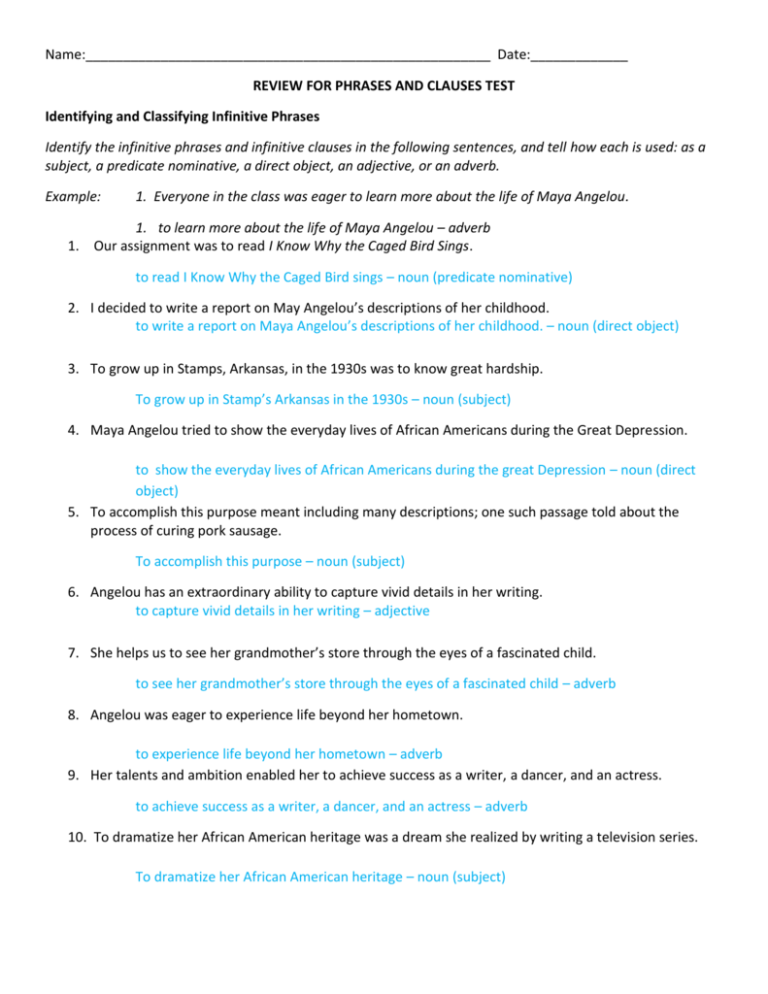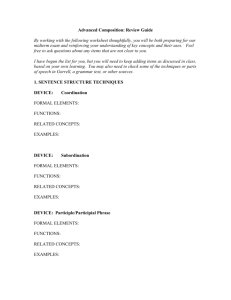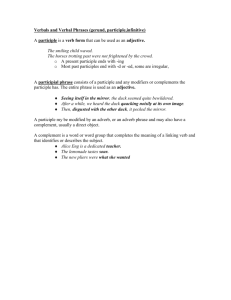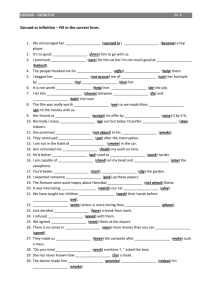here - WordPress.com
advertisement

Name:______________________________________________________ Date:_____________ REVIEW FOR PHRASES AND CLAUSES TEST Identifying and Classifying Infinitive Phrases Identify the infinitive phrases and infinitive clauses in the following sentences, and tell how each is used: as a subject, a predicate nominative, a direct object, an adjective, or an adverb. Example: 1. Everyone in the class was eager to learn more about the life of Maya Angelou. 1. to learn more about the life of Maya Angelou – adverb 1. Our assignment was to read I Know Why the Caged Bird Sings. to read I Know Why the Caged Bird sings – noun (predicate nominative) 2. I decided to write a report on May Angelou’s descriptions of her childhood. to write a report on Maya Angelou’s descriptions of her childhood. – noun (direct object) 3. To grow up in Stamps, Arkansas, in the 1930s was to know great hardship. To grow up in Stamp’s Arkansas in the 1930s – noun (subject) 4. Maya Angelou tried to show the everyday lives of African Americans during the Great Depression. to show the everyday lives of African Americans during the great Depression – noun (direct object) 5. To accomplish this purpose meant including many descriptions; one such passage told about the process of curing pork sausage. To accomplish this purpose – noun (subject) 6. Angelou has an extraordinary ability to capture vivid details in her writing. to capture vivid details in her writing – adjective 7. She helps us to see her grandmother’s store through the eyes of a fascinated child. to see her grandmother’s store through the eyes of a fascinated child – adverb 8. Angelou was eager to experience life beyond her hometown. to experience life beyond her hometown – adverb 9. Her talents and ambition enabled her to achieve success as a writer, a dancer, and an actress. to achieve success as a writer, a dancer, and an actress – adverb 10. To dramatize her African American heritage was a dream she realized by writing a television series. To dramatize her African American heritage – noun (subject) Identifying Verbal Phrases Identify the verbal phrases in the following paragraph. Then tell whether each verbal is a participial phrase, a gerund phrase or an infinitive phrase. Example: [1] Would you like to have a summer job? 1. to have a summer job – infinitive [1] If you are not offered a job right away, remember that contatcing a number of agencies [gerund] and following up with phone calls and thank you notes [gerund] will increase your chances. [2] To Persevere in the job hunt [infinitive] is very important. [3] Finding a summer job [gerund] can be a difficult task. [4] The first step is to scan the classified ads [infinitive] listed in your local newspaper [participle] . [5] After discovering available opportunities [gerund] , you can embark on the second step, which is matching your skills with the requirements of a specific job [gerund]. [6] In most cases you can then contact a prospective employer by making a phone call [gerund] or by writing a letter[gerund] requesting an interview [participle]. [7] If you are asked to interview for a job [infinitive], be sure to take care [infinitive] in preparing [gerund] for the interview. [8] To make a good impression [infinitive], be sure to arrive on time [infinitive], to dress neatly [infinitive], and to speak courteously [infinitive]. [9] Remember to avoid such nervous habits as constantly [infinitive] checking your watch [gerund] or shuffling you feet [gerund]. [10] By presenting yourself as calm, confident, and courteous [gerund], you may hear the magic words “We’d like you to work for us.” 1.___________________________________________ 2.________________________________________ 3.___________________________________________ 4.________________________________________ 5.___________________________________________ 6.________________________________________ 7.___________________________________________ 8.________________________________________ 9.___________________________________________ 10._______________________________________ Identifying Appositives and Appositive Phrases Identify the appositive or appositive phrase in each of the folowing sentences and give the word it identifies or describes. Ex: 1. Dr. Rosen, our family dentist, is a marathon runner. 1. our family dentist – Dr. Rosen 1. Soccer, my favorite sport, is very popular in South American and Europe. my favorite sport – Soccer 2. The internationally famous soccer star Pelé is from Brazil. The internatinally famous soccer star – Pelé 3. Hausa, a Nigerian language, is widley used in western Africa. a Nigerian language -- Hausa 4. Have you met my teacher Mr. Zolo? Mr. Zolo – my teacher 5. Roseanne’s youngest sister, Susan, speaks fluent Spanish. Susan – Roseanne’s youngest sister 6. Is your friend Greg getting married? Greg – your friend 7. Cindy, a student at the community college, is studying computer-aided drafting. a student at the community college – Cindy 8. The New York City Marathon, one of the largest spectator sports in the United States, is held each November. one of the largest spectator sports in the United States – New York City Marathon 9. The Himalayas, the highest mountains on earth, are magnificent. the highest mountains on earth – Himalayas 10. Always the one to object, Blair said, “Not on your life!” Always the one to object – Blair Identifying Verbal and Appositive Phrases The following paragraph contains ten verbal and appositive phrases. Identify each phrase as a participial phrase, a gerund phrase, an infinitive phrase, or an appositive phrase. Ex: [1] Who was responsible for designing the Brooklyn Bridge? 1. designing the Brooklyn Bridge – gerund phrase [1] The Brooklyn Bridge, a remarkable feat of design [appositive], spans the East River in New York City. [2] Linking the boroughs of Brooklyn and Manhattan [participle], it was once the longest suspension bridge in the world. [3] Most of the pedestrians who cross the bridge are impressed by the grandeur of its graceful cables, a magesty that a picture cannot fully evoke [appositive] . [4] To support the towers on the bridge [infinitive], the brilliant John A Roebling, its engineer [appositive], designed airtight caissons filled with concrete[participle]. [5] Working underwater on the caissons [Gerund] was painstakingly slow and extremely dangerous. [6] The workers also faced great danger when they had to spin the cables from one side to another [infinitive]. [7] Because of these hazards, the bridge is rememberd not only for being a masterpiece [gerund] but also for having cost the lives of many of its builders [gerund]. 1.___________________________________________ 2.________________________________________ 3.___________________________________________ 4.________________________________________ 5.___________________________________________ 6.________________________________________ 7.___________________________________________ Identifying Independent and Subordinate Clauses For each of the following sentences, identify the italicized clause as independent or subordinate. 1. Whenever I think of Barbara Jordan, I imagine her as she looks in a picture taken at my mother’s 1986 college graduation. subordinate 2. According to my mother, Jordan spoke eloquently about the imporantce of values in our society. independent 3. Of course, her choice of subject mater surprised no one since Jordan had long been known as an important ethical foce in American politics. independent 4. When Jordan began her public service career in 1966, she became the first African American woman to serve in the Texas legislature. subordinate 5. In 1972, she won a seat in the U.S. House of Representatives, where only one othe rblack woman – Shirley Chisholm – had ever been a member. subordinate 6. However, Jordan was still not widely recognized until she gave the keynote speech at the 1976 Democratic National Convention. subordinate 7. Seen on television by millions of people, Jordan immediaely gained national attention. independent 8. Two years after the speech, Jordan decided that she would retire from national politics. subordinate 9. After she returned to Texas in 1978, Jordan taught at the University of Texas at Austin. independent 10. From 1991 until her death in 1996, she served on various government committees and used what she had learned in her many years of public service to fight corruption in politics. subordiante Identifying Adjective Clauses Identify the adjective clauses in the following sentences and underline the relative pronoun or relative adverb in each clause. Then, give the word or word that the relative pronoun or relative adverb describes or modifies. Ex: 1. The topic that Melissa chose for her essay was difficult. 1. that Melissa chose for her essay – topic 1. A speech community is a group of people who speak the same language. who speak the same language – people 2. There are speech communities that contain millions of people and some that have only a few. that contain millions of people – communities ; that have only a few – some 3. The first language that you learn is called your native language. that you learn – language 4. People who master a second langauge are bilingual. who master a second language – people 5. English, French, and Spanish, which many diplomats can speak, are among the six official languages of the United Nations. which many diplomats can speak – English, French, and Spanish 6. Those who conduct business internationally often need to know more than one language. who conduct business internationally – Those 7. Russian, Chinese, and Arabic are the other three languages that are used officially at the UN. that are used official at the UN -- languages 8. People for whom language study is important include telphone operators, hotel managers, and police officers. for whom language study is important – People 9. Tourists traveling to coutnreis where they do not know the local languages can find themsleves at a disadvantage. where they do not know the local languages -- countries 10. French is a language that is widely understood in parts of Euproe, Africa, Southeast Asia, and the Middle East. that is widely understood in parts of Europe, Africa, Southeast Asia, and the Middle East – language Identifying Adverb Clauses and Subordinating Conjunctions Identify the adverb clause in each of the following sentences, and underline the subordinating conjunction. Ex: 1. While the others worked inside the house, Ruth, Lou, and I worked in the yard. 1. While the others worked inside the house 1. Because the house had been vacant for so long, the lawn and gardens were overgrown. 2. The grass in the front looked as if it hadn’t been cut in months. 3. Rugth began mowing the lawn whlie Lou and I weeded the flowerbeds. 4. We decided to borrow some tools because the weeds were extremely thick. 5. We were unable to cut through the heavy undergrowth until we started using a machete. 6. Before we pulled out the weeds, we couldn’t even see the roses. 7. We piled the debris in a huge mound so that it could be hauled away later. 8. After Ruth had mowed the lawn, she was exhausted. 9. We all stretched out in the shade when we stopped for a rest. 10. Long hours in the sun had made us feel as though the day would never end. Identifying and Classifying Noun Clauses Identify the noun clauses in the following sentences. Then tell how each clause is used: as a subject, a predicate nominative, a direct object, an indirect object, or an object of a preposition. Ex: 1. Mr. Perkins, the band director, announed that we would play at half time this week. 1. that we would play at half time this week – direct object 1. Mr. Perkins did not tell us, however, what we would be playing during the half time show [direct object]. 2. What we can never predict [subject] is whether he will chose a familiar march or a show tune [predicate nominative]. 3. He always gives whoever is asked to play each selection [indirect object] a chance to express an opinion about it. 4. He is genuinely interested in what we think of his sometimes unusual choices [object of a preposition]. 5. A drummer once told Mr. Perkins that she did not like most show tunes [direct object]. 6. How she could say that [subject] is a mystery to me. 7. Mr.Perkins told us that we would play a medly of marches [direct object]. 8. What everyone wanted to know immediately [subject] was who would play the solos [preicate nominative]. 9. He understands why that was our first question [direct object]. 10. The crowd always applauds enthusiastically for whoever plays a solo [object of a preposition]. Classifying Sentences According to Structure Classify each of the sentences in the following as simple, compound, complex, or compound complex. 1. Organizing the rummage sale, the Key Club requested donations from everyone at school. simple 2. The club members accepted whatever was donated, but they welcomed hosewares most. compound complex 3. The principal donated a vaccum cleaner; the soccer coach contributed a set of dishes; and several of the teachers provided towels and sheets. compound 4. The club sold almost everything that had been donated, and the members celebrated their success with pitchers of lemonade. compound complex 5. Afterward, they gave all the profits that they had made from the sale to the city’s homeless shelter. complex 6. The shelter’s emplyees were very grateful for the donations. simple 7. The offered the members of the Key Club the chance to tour the facility. simple 8. John took photos, and I interviewed both staff members and clients of the shelter. compound 9. After we had finished our article, we took it to the editor of the school newspaper. complex 10. The story was published in the next issue, and we received many compliments even though we hadn’t expected any praise. compound complex




